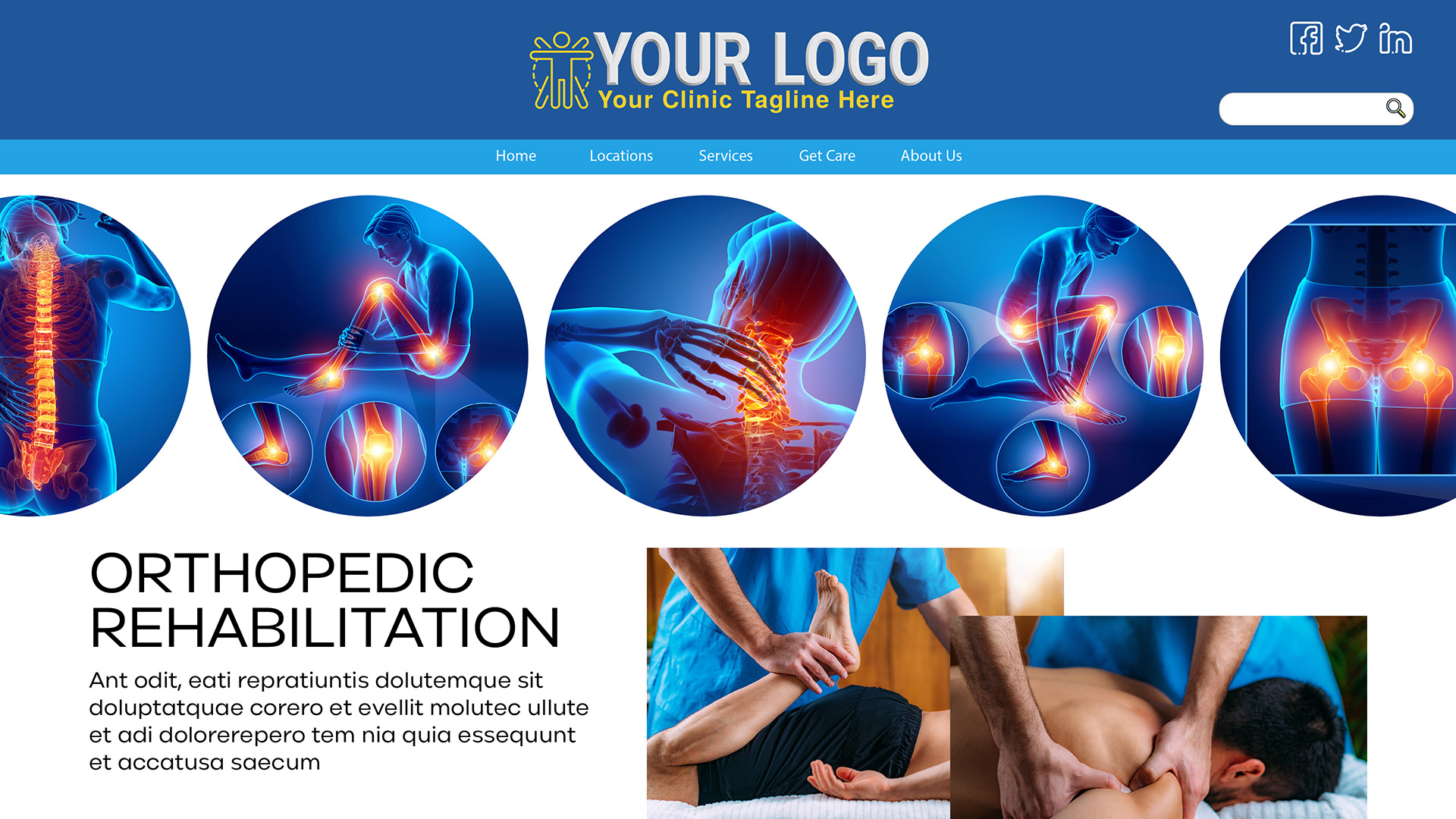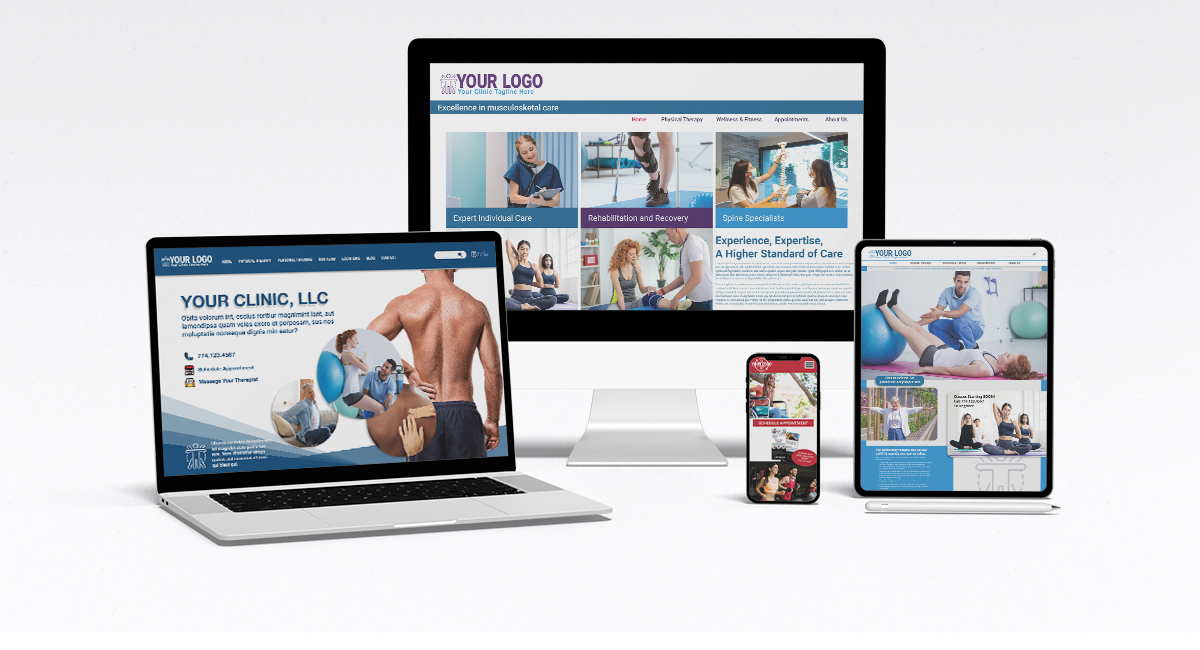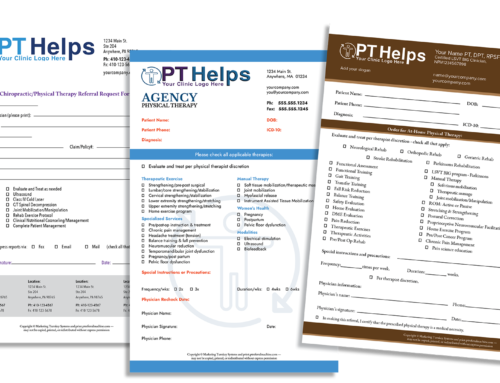Physical Therapy Website Services – Which Ones You Need and Which Ones You Can Do Without
Introduction
Website decisions grow more important every day for physical therapy practitioners. Gone are the days when a clinic could get by with a cheap $39/month website tool, a few clinic pictures, and contact information.
Today, to be competitive, your site needs to attract and convert visitors. Unfortunately, this requires search engine optimization and providing site visitors with the best user experience possible. In today’s world, your website is the hub of your practice marketing.
If you’re not satisfied with your website performance, this article has some points to consider as you review your web services.
Think of Your Website as a Search Engine Warrior
Before getting into some of the key considerations, it helps to think about the internet challenge as a war for search visibility. Before you go to war, you need to choose your weapons, and that’s not as easy as it sounds.
Unfortunately, the battlefield is controlled by search engines like Google and Bing. As a result, whoever is in charge of building and maintaining your website needs the right expertise and tools to keep your site visible, and know what to do when it’s not.
The only control you have over the relevant searches for your service is the way you build and manage your site.
The Only Way To Win The Web War Is To Provide The Best Possible User Experience
To build and manage your site effectively, you need to follow some best practices for physical therapy websites. These include making your website aesthetically pleasing, mobile-friendly, and on-brand; including an “About Us” section, a list of conditions you treat and services you offer, and a list of your accepted insurances; linking to your social media pages and posting patient reviews and testimonials; making it easy to book an appointment online and providing educational content; and researching your options before hiring a web developer.
You also need to make your website search engine friendly, which means using proper page titles, URLs, and meta descriptions; optimizing your site speed and navigation; using relevant keywords and headings; and creating fresh and original content.
By following these tips, you can make your website a search engine warrior that attracts and converts more visitors into patients. You can also learn from the examples of some of the best physical therapy websites in the industry, such as Ivy Rehab Network, SPEAR Physical Therapy, Foothills Sports Medicine, Apex Physical Rehabilitation & Wellness, ApexNetwork Physical Therapy, and Twin Boro Physical Therapy.
These websites demonstrate how to create a user-friendly, informative, and professional online presence that showcases your expertise and value proposition. Your website is the hub of your practice marketing, so make sure it reflects your brand and your mission.
Choosing the Right Platform and Webservices Agency
Most people reading this article should not expect (or even attempt) to build and maintain their online business presence themselves. Despite the TV commercials (like WIX) promoting “click-click and you’re done,” this is a really bad idea. Most likely, while the site might look fine, it will not be competitive or meet all of your needs. The reasons why should become more obvious as you read on.
To begin, there are several different types of outsourced webservices to choose from. The webservice you select will play a major role in determining your clinic’s ability to compete for new patients online.
DIY Website Builders (WIX, Weebly, Squarespace, etc.)
Although many clinic owners find the promise of easy site setup very seductive, it’s a false promise. In fact, we get more inquiries from clinic owners asking for help with a WIX, Weebly, or other similar web-builder than anything else. A ShivarWeb review of platforms like WIX explains the pros and cons more fully. https://www.shivarweb.com/4794/wix-review/
Although these services promise drag-and-drop editing that builds your site in minutes, it still takes considerable effort to design your site and create the content. Their primary advantage is that they make it very easy to get started. That’s it. This advantage is quickly overshadowed by limitations. These include limited extensions, apps, and SEO tools. But my biggest criticism is the lack of support for creating strategic content.
Unless professionally designed and managed for you, choosing one of those services puts you at an immediate competitive disadvantage online.
Local Website Developers
Many clinics like to use local website developers to host and design their site. While this is more expensive than the drag-and-drop web builder option discussed above, you get what you pay for. The right agency will do more than deliver pleasing graphics – they’ll also help you plan your site structure and write the content. When done right, a professionally developed site will outperform the WIX-style in every area; performance, user experience, search visibility, and return on investment. One caveat: make sure the agency has extensive experience with other healthcare or professional services clients. In particular, pick them for their SEO plan rather than their impressive designs.
To avoid picking the wrong agency, make sure to get the site content and SEO plan in advance. When done right, the site should produce a measurable return on investment.
Physical Therapy Website Companies
As an industry insider, I could share my views on which PT website agencies I would recommend, but there’s really only one, and you’ve found it! 😉 All kidding aside, it’s a mistake to choose any agency (specializing in PT or not), unless you have an understanding of the performance goals for the site. From a clinic owner’s standpoint, this means you need a written plan that includes:
- Costs.
- Return on investment.
- Analysis of current search appearances for you and your top direct competitors.
- Traffic projections by your select keyword phrases.
- SEO and strategic content plan.
Without this type of plan, your relationship can not be a strategic partnership.
As I just stated, since the entire point of choosing an agency that focuses on physical therapy websites is to leverage their experience and expertise, it should be a strategic relationship. When you work with a physical therapy website agency, they already have 85% of the SEO and content plan you will need to launch the site. This type of expert knowledge not only makes the production process go more quickly, it’s done with strategic purpose. In addition, a specialized PT agency has the added advantage of putting more effort into special features to improve your user’s experience. For example, interactive forms, interactive scheduling, payments, product sales, and telemedicine. And if that’s not enough bang for your buck, most PT website companies offer additional added value with PT specific newsletters, email marketing, referral strategies, and other specialized content.
Local Search Engine Optimization (SEO)
No matter what platform or agency you use, make sure to get the right “dose” of SEO. There is a lot of confusion over what SEO is and how it works. The biggest problem I see is that many clinic owners approach it like something you turn on only when you need it. Unfortunately, it doesn’t work that way.
Search engine optimization requires an ongoing plan. Like any other business plan, it requires regular effort and monitoring. You just can’t decide one day you need it, buy a plan tomorrow, and have it working the day after. Like fitness, it’s progressive.
A good SEO plan will look at the services you want to promote, research the keyword phrases, create a content management plan, carefully craft page descriptions and tags, cultivate back linking, and, perhaps, do some paid ads. Depending on the traffic you need to meet your new patient acquisition goals, the level of effort will vary. However, there is an appropriate strategy for every size clinic.
Tracking & Reporting
Regardless of the hosting and/or agency you choose, you need good reporting. Get good data and PAY ATTENTION to it. Benchmark and monitor your traffic, site performance, and search appearance data. Free Google Analytics and Google Search Console are essential, but they’re not a complete tracking and reporting solution.
A complete solution includes other data like site performance, competitor websites, linking analyses, site authority, detailed visitor information, and other key stats. You’ll need all of that to stay on top of things. To buy them separately is cost prohibitive for most PTs, but agencies like PTRM provide them for you as part of a website package services bundle.

Physical Therapy Website – Services You Can Do Without
Medical Media Content Accounts
In my opinion (and I have the data to back it up), physical therapy website managers should avoid purchasing content subscriptions for medical content unless they have extra budget. The reason is simple: It just doesn’t get used.
For example, many sites feature a musculoskeletal graphic with body parts to click on. You click through and it provides an explanation of common problems. Another example is a library of orthopedic medical articles. Years of tracking data show two things about these types of medical content:
A) Medical information and symptom checkers do not get used by most site visitors; and
B) They don’t positively impact local search engine rankings. Instead, what most PT site visitors prefer is clinic-specific information, not medical. That’s because when looking for medical information, search engines and users prefer medical sites like WebMD and the Cleveland Clinic, not their PT provider. The exception is clinic-specific content about certifications, training, and the related equipment and treatment.
Home Exercise Video Accounts
Perhaps the online exercise video account will become more popular, but what we observe is not good. Clinics fail to implement properly because it’s hard to manage. It’s also hard to get patients to use. Unless you are committed to a disciplined implementation, this budget is better spent on SEO for acquiring new patients.
Here at PT Referral Machine we take it one step further – we integrate your website with a complete clinic marketing solution based on the Strategic Marketing Plan best suited for your unique practice and market conditions. Get started on your new plan today.
A Word About Company Facebook Pages
Many clinics use Facebook as their primary web page. Although it is important to consider how you may use social media to engage your community, these pages are not substitutes for website pages. Without getting into a long list of all the problems and limitations, I’ll get to the bottom line: You have much less control over managing your web presence and will not be competitive online. Adweek has a great article on this for those who want to dig further. And with respect to the importance of Facebook for clinic marketing, read our article, PT Marketing With Facebook.
In conclusion, if you invest in the right mix of services and support, your website will be an important part of your success as an independent practitioner.
PT Referral Machine Newsletter Signup
Stay up to date on the latest trends in marketing for physical therapists – From The Trenches.









Leave A Comment
You must be logged in to post a comment.